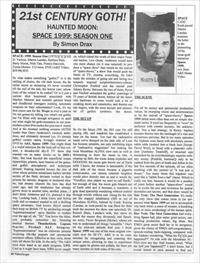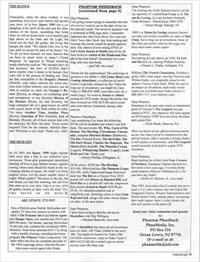Videoscope
Videoscope (full title "The Phantom of the Movies' Videoscope") was film magazine that ran for 115 issues from 1993 to 2020. It focused on reviewing video and DVDs of science fiction, horror and exploitation films. Editor John Kane had previously been editor of Monster Times. All issues are available online via University of Pittsburgh.


By Simon Drax
VideoScope Number 40, Fall 2001, p30-31
SPACE: 1999: Season One (l975) ***1/2
D: Various. Martin Landau, Barbara Bain,
Barry Morse, Nick Tate, Prentis Hancock,
Zienia Merton. 312 mins. DVD (AE Video,
$39.98) 8/01
So what makes something "gothic?" Is it the rattling of chains, the old dark house, the familial secret so menacing it's never revealed till the end of the tale, the horror (see: adoration) of the corpse in its casket? Or is it just a current idiot buzzword associated with Marilyn Manson and toenails painted black and disaffected teenagers training automatic weapons on their schoolmates? Look, it's my first return rant for the 'Scope in over a year so I'm not gonna try telling you what's not gothic but I'm filled with enough arrogance to spell out what might hit goth-resonance in our post modern-cyber-if-it-works-for-you-use-it world. And at the moment nothing screams GOTH! louder than Gerry Anderson's vaunted, ambitious, and ultimately doomed (yo, it's already gothic) cosmic opera, lovingly restored on DVD by AE, Space: 1999. One might think it a weird selection for the kick-off of this column, a decades-old sky-fi TV show that wanted so many levels-to be 2001's baby. But look beyond the superficial tropes (spaceships, planets, laser beams) of the genre, and gothic atmospheres and archetypes abound: floating haunted houses the size of cities whose pristine inhabitants harbor terrible secrets of the flesh; deviants locked in their prisons for eternity; dragons in shuttered closets; bad dreams wherein the hero has died years ago, and his tombstone has already grown moss in another time, another place.... I don't think Anderson and Co. planned it that way. Looking back, I think Gerry and Sylvia (wife and co-creator) wanted to tell a thrilling space adventure. God knows they'd earned their keep on British TV by producing enough "supermarionation" epics familiar to readers over the age of; uh, "30." You know the titles, you probably remember the booming musical themes: Thunderbirds. Captain Scarlet. Fireball XL5. Stingray.
"Supermarionation" was an elaborate process involving life-like puppets and spectacular miniature effects. Effective as they were, those were all shows for kids. In the early '70s, G&S tried their hand at an adult program, UFO. Cool as it might have been, UFO never caught on, which risked the wrath of their major financial backer, Lew Grade. Anderson would have one more chance (so it was rumored) to produce a "space show" that would be the end-all of "space-shows," a show that would push the limits of TV, cinema, everything. So G&S made the mistake of going out and hiring two insanely inspired scriptwriters/story-editors, Christopher Penfold and the eternal poet Johnny Between the two of them, Byrne and Penfold unleashed the gothic yearnings of 75 years of British doom; behind all the futuristic hardware to come would lurk a lot of creaking doors and cemeteries, and therein our tale begin with the most ancient and elemental of gothic symbols: the moon.
So it's the future ('99: the IRS year I'm still paying off), and mankind has established a base on the moon. Too bad the radioactive waste we've dumped on the dark side of Luna has become unstable, not only exhibiting signs of "radioactive magnetism" but making the local Moonbase ALPHA crew nuts as well as threatening to blow the moon to bits. A cleanup op fails, the waste dump explodes and DOOOOM: the moon gets blown out of Earth orbit. I know, the science is lamentable: if the dark side of the moon became a gigantic rocket-motor, our closest celestial neighbor would plow directly into us and it would be, "Goodbye, nice planet we used to call Earth," but enough of that; the moon gets blasted out of Earth orbit and it becomes a wanderer, a gray dead spaceship wandering without control through worlds without end. Along for the ride are the trapped inhabitants (300 or so) of Moonbase ALPHA, helmed by Cmdr. Koenig (Landau, so rock-jawed he was fitted for false teeth the moment the show was canceled), Dr. Russell (Bain, Landau's wife, this show no doubt the reason they divorced), and Spock, no, sorry, Victor Bergman (Morse), whose job was to understand all things "scientific." Don't let my wise-ass attitude fool you; I think Space: 1999 was one of the most original concepts ever for SF-TV. AE is to be commended for recognizing and restoring this unique series, allowing its fans to experience once again its glories and pitfalls, for there are many notches on both sides of the coin.
For all its money and spectacular production values, its sweeping vision and determination to be the end-all of "space-shows," Space: 1999 failed more often than not on simple dramatic terms. It tried too frequently to "wow" its audience with cosmic mystery, the unknowable. Not a bad strategy, in theory: hapless humans thrown into the onslaught of a vast and mysterious universe. But in too many episodes the Alphans were faced with absolutely unwinnable odds (sucked into a black hole [Script: David Weir), or faced with a planetary collision [Anthony Terpiloffj, or smashed into moondust by an overwhelmingly superior military enemy [Penfold, bummer) only to be yanked from the jaws of death and defeat in the last five seconds of the episode, all too often resulting with the yawner of "it was just a dream." Too many times this trapdoor was used like a "rabbit from a hat" clause. Which is really too bad, because it would be a number of years before another "space-show" would try to evoke the awe and reverence for spatial anomalies not known, and that show would be Star Trek: The Next Generation. It's really the only show that comes close to (or surpasses) what Space: 1999 set out to accomplish way back when: a sense of wonder, a humbling (and, at once, awakening) of the human spirit. Star Trek: The Next Generation had every thing Space had, plus some: great actors, out standing production values, big ideas. But TNG's great secret fault lay in its arrogance; given the choice of TNG's self-congratulatory, episode-ending back-slapping, compared with the Alphans wondering, "What the f**k just happened?!" I'd side with the Moonbase ALPHA crew any day: frail, human, awed. "What the hell just happened?!" I don't know, but I would intend to stick around to find out.
Fortunately, when the show worked, it was something we'd never seen before and haven't seen since. At its best, Space: 1999 was a co-mingling of the spirit of the past and the ultra science of the future, something that holds what we will no doubt need: a two-handed grip that allows us the Dark and the Light, the Good and the Bad, the gothic: the living that accepts the dead. "We cannot truly live in the sun, until we accept the dark of the moon." Or: "In all we have learned, we have learned that we have so much more to learn."-Victor Bergman. As opposed to Picard mouthing empty platitudes such as, "We humans don't do that anymore," the crew of ALPHA didn't know exactly what it meant to be human; they were still in the process of finding out. Thus are they susceptible to the Dragon's Domain (Penfold, yeah baby] wherein the worst enemies exist within memory, and memory can do little to comfort us when our Voyager's Return [Byrne], an allegory of everlasting guilt and recompense, or (my favorite) Mission of the Darians [Byrne, my real favorite], the huge entangled tale of a great house set adrift with a great secret of the flesh within its walls. Yet more: Another Time, Another Place [Byrne], Guardian of Piri [Penfold], End of Eternity [Byrne]...all of these stories deal with the darkness, the flesh, the dead. Those rocket engines? Fires for the corpses. Marilyn Manson? Welcome to my crypt. Thank you, AE.
So it's 2001 and Space: 1999 might register little more than a blip in our collective consciousness. Those gray grasshopper spaceships blasting off from a gray lifeless terrain, engines roaring where none should be heard in the enveloping blanket of space...So what? Let those engines whine. Let the moon wander where it might. What's gothic? The moon in the sky, the bad dream you had this morning, the red river that came up to your door. Like it or not, we're all gothic; sooner or later, we're all dead. Victims buried on the moon.